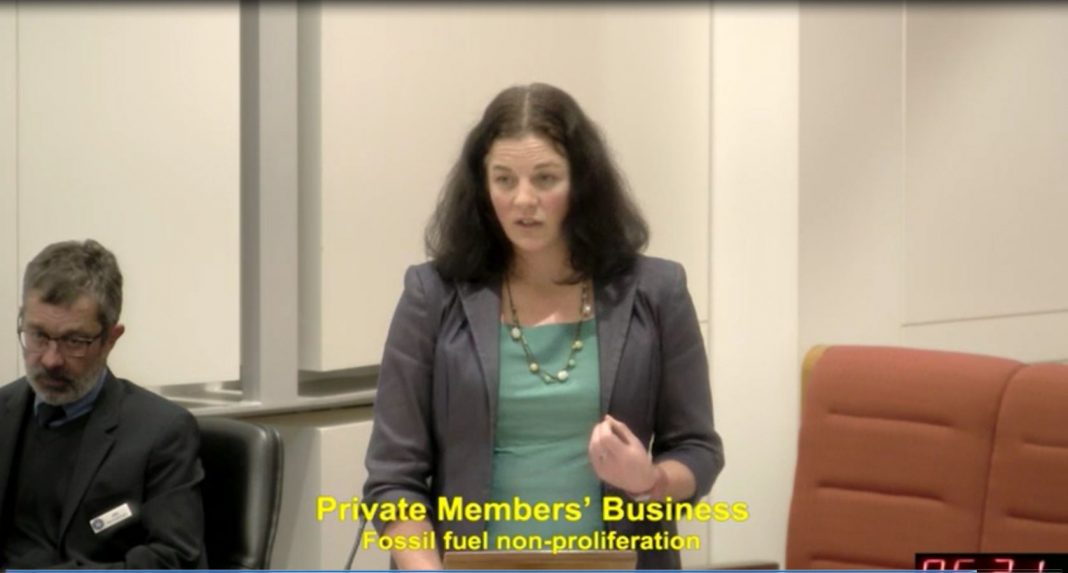The ACT Government will write to the Federal Government and other states and territories, urging them to endorse a call for a Fossil Fuel Non-Proliferation Treaty. On Wednesday, the ACT became the highest level of government in the world to support the Treaty.
“This treaty would call on Australia to leave fossil fuel in the ground and to stop subsidising a dead industry,” Greens MLA Jo Clay, the motion’s proponent, said.
“This is part of a global push to phase out fossil fuels. This treaty would ensure a just transition and it would ensure that we leave no member of our community behind.”
The Fossil Fuel Non-Proliferation Treaty, modelled on the 1968 Nuclear Non-Proliferation Treaty, calls for: (1) an end to new fossil fuel exploration and expansion; (2) the phasing out of existing production, financing low carbon alternatives through a Global Transition Fund; and (3) equitable transition plans to make sure people have energy and jobs in the green economy.
The climate crisis is as much an existential crisis as nuclear weapons were half a century ago, Ms Clay believes.
“We’re facing another apocalypse now. We are in a climate emergency. People made climate change happen. And people can stop it.”
We must achieve net zero emissions by mid-century to limit global warming to 1.5℃, the Intergovernmental Panel on Climate Change has stated. Most of those cuts need to occur in the next decade, according to the Climate Council. The Paris Agreement calls on countries to lower greenhouse gas emissions by 45% by 2030, cutting emissions worldwide by 1 to 2 billion tonnes each year. There is no room for new fossil fuel infrastructure if we want to stay within a safe climate range, the International Energy Agency has said.
But, Ms Clay’s motion states, global governments and the fossil fuel industry plan to produce 120% more emissions by 2030 than would avert catastrophe.
In this country, the Federal Government subsidises the fossil fuel industry by $10.3 billion each year, according to the Australia Institute.
The ACT has already faced the brunt of climate change, Ms Clay noted: the hottest January on record (2019), the hottest ever day on record (4 January 2020), the most hazardous air quality in the world (during last year’s ‘Smokeocalypse’), and bushfires that damaged national parks and killed wildlife and plants.
“A Fossil Fuel Non-Proliferation Treaty could keep large swathes of fossil fuel in the ground,” Ms Clay said. “It would do this effectively and it would do this fairly. It would start with an assessment of existing reserves and an agreement about how we phase-down production. It would align fossil fuel use with Paris Agreement targets. It would help the poorest countries get through this difficult phase and give them energy independence.”
Other cities – Moreland (in Melbourne), Barcelona, Los Angeles, and Vancouver – have endorsed calls for the Treaty. So have more than 4,000 organisations, 1,300 scientists and academics, and the Dalai Lama and 100 other Nobel Prize winners. Ms Clay expected other councils and state and territory governments would also sign up.
The ACT already led the nation on climate change, she said. It was the first Australian jurisdiction to declare a climate change emergency, in 2019; last year, it became the biggest jurisdiction outside Europe to achieve 100% renewable energy; and the government intends to achieve zero net emissions and phase out fossil fuel gas by 2045.
“The ACT is a beacon of hope,” Ms Clay said. “We can maintain our position at the forefront of climate action in this country. … What we do in the next decade will determine our planet’s future.”
Chief Minister Andrew Barr and by Greens leader Shane Rattenbury supported Ms Clay’s motion.
Mr Rattenbury predicted Australia could become a renewable energy superpower, exporting zero emission, renewable energy, and technologies worldwide. Doing so would create thousands of zero-emission jobs in renewable electricity, green hydrogen, green manufacturing, and technical expertise.
Ms Clay claimed there were twice as many jobs in renewable energy as in fossil fuel projects; the green economy, she claimed, was more innovative and less automated.
“We don’t have time for excuses,” Mr Rattenbury said. “We don’t have time for Federal Government policies that protect the fossil fuel industry at the expense of our future. We need decisive action nationally and globally. Anything less is a deliberate decision to expose our communities to unacceptable harm and future climate risks.”
The Canberra Liberals agreed that the Legislative Assembly needed a comprehensive plan to achieve net zero emissions by 2045, but thought Ms Clay’s motion was a diversion from the ACT Government’s lack of action on climate change.
“There is no point in feel-good targets with no roadmap to achieve them,” said Leanne Castley MLA.
The Government had not established a 10-year review of the Climate Change and Greenhouse Gas Reductions Act, and had not liaised with the community or the Canberra Liberals about the Treaty, she said.
Mr Rattenbury replied that Ms Castley’s allegations were red herrings and misrepresentations; the review was initiated in April, and would be completed in September. Ms Clay said she had contacted Ms Lee’s office seven times.
Rising electricity prices, increased costs of living, housing and homelessness, hospital waiting times, and worrying education standards were more immediate concerns for many Canberrans, Ms Castley said.
“It says everything about the priorities of this Labor/Greens Government that they would rather make-believe the ACT Legislative Assembly is the UN General Assembly instead of taking genuine action on pressing issues that directly affect Canberrans.”
For more news:



